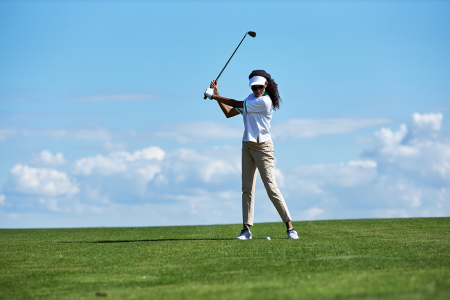275 golfers urge LPGA to ban trans-identified men from game

Nearly 300 golfers have signed a letter expressing concern about the LPGA policy allowing men who identify as trans to compete against women.
On Monday, the advocacy group Independent Women’s Forum announced in an X post that 275 female golfers had sent a letter asking the golfing organization’s leadership to get rid of “all policies and rules that allow male golfers to participate in women’s golf events.”
Riley Gaines, a former competitive female swimmer and outspoken critic of policies allowing trans-identified males to compete in women’s sports, cited the letter as evidence that a “movement is now in motion” where “girls are finally pushing back” during an appearance on “Fox & Friends” Wednesday.
Gaines said women athletes are finally pushing back, noting that college volleyball players at five universities in the Mountain West Conference have forfeited their games instead of playing against a man who has been allowed on a women's team, along with high school soccer teams in New Hampshire that are doing the same.
The Independent Women’s Forum shared the full text of the letter on Tuesday. While it was initially released on Aug. 19, it was recently made public after a man named Hailey Davidson began competing in the second stage of LPGA qualifying school.
“LPGA policy does not explicitly state eligibility based on sex,” the letter reads. “It is essential for the integrity and fairness of women’s golf to have a clear and consistent participation policy in place based on a player’s immutable sex.”
The letter outlined some of the biological differences between men and women that give males an advantage over their female counterparts in golf, calling them "enormous."
“Anatomical differences between males and females affect clubhead speed and regulating consistency at ball contact. Females have higher mean heart rates and encounter greater physiological demands while playing, especially at high altitudes," read the letter.
After insisting that “the anatomical differences are not removed with male testosterone suppression,” the athletes listed “a lower maximum velocity of the wrists, left wrist extension velocity, and clubhead velocity” compared to their male counterparts, as well as the fact that “women take more time to reach peak arm speed and have lower peak wrist speeds than men” as additional biological disadvantages.
“Males have a large performance advantage in driving distance,” they noted. “Clubhead speed is correlated with explosive, large muscle activities which favor males.”
The women golfers warned that “failure to address this issue has already led to reduced involvement and achievement by females who are compelled to compete against men without an option for an exclusively female category.”
A report compiled by the United Nations Special Rapporteur on Violence Against Women and Girls published in August found that as of March, “over 600 female athletes in more than 400 competitions have lost more than 890 medals in 29 different sports” as a result of trans-identified males competing in women’s sports.
According to its official policy, the LPGA allows men who identify as women to compete in games and provides "an avenue to membership and opportunity to participate in events ... "
The LGPA requires trans-identified athletes to have undergone "hormonal therapy" for a minimum of one year.
Concerns about the impact of allowing men to compete in women’s sports have been amplified by Gaines’ own experience of tying for fifth place in a championship with trans-identified swimmer Lia (Will) Thomas. Her story has prompted several states to enact laws requiring athletes to compete on teams that correspond with their sex instead of their self-declared gender identity.
Professional sporting organizations often need to catch up in implementing similar policies, although USA Powerlifting and the World Boxing Council are notable exceptions.
Ryan Foley is a reporter for The Christian Post. He can be reached at: [email protected]






















